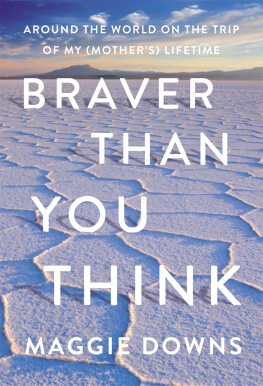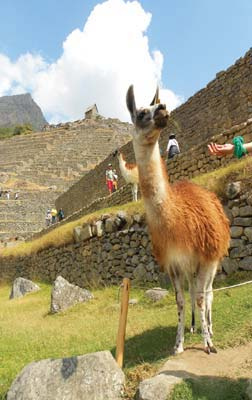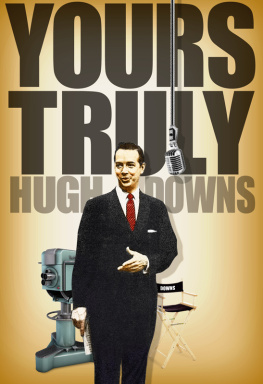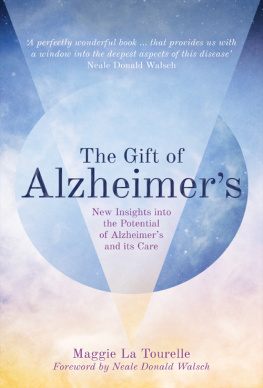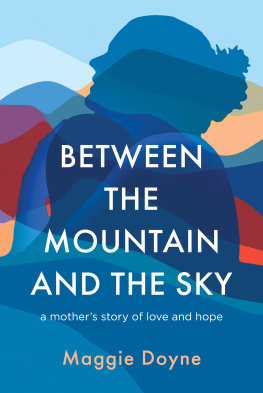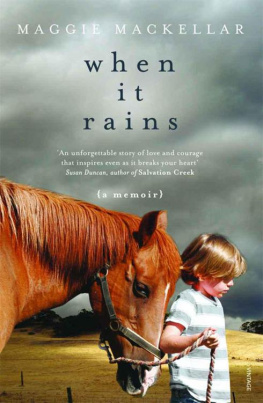Braver Than You Think

B RAVER T HAN Y OU T HINK
Copyright 2020 by Maggie Downs
First hardcover edition: 2020
All rights reserved under International and Pan-American Copyright Conventions. No part of this book may be used or reproduced in any manner whatsoever without written permission from the publisher, except in the case of brief quotations embodied in critical articles and reviews.
Braver Than You Think is a work of nonfiction. Events have been reconstructed from notes, blog posts, personal journal entries, and my own subjective memory. Some names and other identifying characteristics have been changed to protect privacy. In some instances, I compressed time, removed people, and skipped over locations. (For the latter, I apologize to the entire country of Laos. I was very happy there.)
Library of Congress Cataloging-in-Publication Data
Names: Downs, Maggie, author.
Title: Braver than you think : around the world on the trip of my (mothers) lifetime / Maggie Downs.
Description: First hardcover edition. | Berkeley, California : Counterpoint, 2020.
Identifiers: LCCN 2019030639 | ISBN 9781640092921 (hardcover) | ISBN 9781640092938 (ebook)
Subjects: LCSH: Downs, MaggieTravel. | Downs, MaggieFamily. | Voyages around the world. | Backpacking. | Alzheimers diseasePatientsFamily relationships. | Terminally ill parentsUnited States. | Mothers and daughtersUnited States. | Parent and adult childUnited States. | Women authors Biography. | Authors, American21st centuryBiography.
Classification: LCC G440.D74 A3 2020 | DDC 910.4/1092 [B]dc23
LC record available at https://lccn.loc.gov/2019030639
Jacket design by Sarah Brody
Book design by Jordan Koluch
COUNTERPOINT
2560 Ninth Street, Suite 318
Berkeley, CA 94710
www.counterpointpress.com
Printed in the United States of America
Distributed by Publishers Group West
10 9 8 7 6 5 4 3 2 1
For Mutti. You were with me even when you werent. No one expected me. Everything awaited me. P ATTI S MITH
C ONTENTS

Braver Than You Think

T HE AIRPLANE BEGINS ITS DESCENT INTO C AIRO, BUT I dont even look out the window. Ive had the shade drawn the whole twelve hours, all the way from the United States, a time in which I didnt sleep but was not awake either.
Sorrow does that.
I shuffle off the plane in what has become my standard uniform: navy flip-flops and hiking pants that unzip just above the knee to convert into shorts. The hood of my sweatshirt is pulled over my head, my long, unruly curls tucked inside the fabric. If anyone bothered to look at me, theyd see red, gutted eyes and a clenched jaw, not the kind of person theyd want to make conversation with anyway.
The last time I landed in Cairo, it was a different story. I had a window seat then too, and I didnt close the shade at all. I pressed my face to the smudgy plastic, watched the green band of Nile slice through the billowy, beige fabric of the country. As the aircraft descended, the land appeared to breathethe mountains, the dunes, the shifting sands. It was like a golden exhale. Even closer to the ground, the light of the city shifted with glass and metal, glowing like a tigers-eye stone. My cheeks flushed with warmth; my eyes felt clear and open. I chattered with strangers at baggage claim. I made conversation with the taxi driver.
That was almost a month ago. Before my mother died of Alzheimers disease. Before I traveled home to Ohio for a funeral, buried my mom on a snowy day, and flew back to a desert, shrouded in grief and fleece. Before.
But now something else is off, too. At the airport I try calling home from one of the pay phones, just to let my family know that I made it to my destination, but the line is dead. I try each phone. None of them work.
The airport internet caf is closed. When I ask how I can get online or make a call, I am met with shrugs. Thats when I notice the men in uniforms, standing in the airport windows.
My eyes are wild now, scanning the crowd. There are businesspeople in suits, women in head scarves, men in galabias that drag along the ground. Children and teenagers, suitcases and strollers. Nobody else seems panicked. But now I pick out soldiers, armed and walking among the travelers. They carry themselves with the unmistakable air of authority, their footfalls purposeful and strong. Though the security is impressively tight at the Cairo airport, I dont remember such a strong military presence before.
My eye finally lands on a TV, where a crowd is gathering to watch BBC News. The footage shows tanks and rioters, piles of people throwing stones and wrestling each other to the ground. The background of the footage begins to take shape and look familiar. Its Tahrir Square, just a block from the hostel where I intended to stay.
A red graphic with bold letters flashes across the screen: Egypt in crisis! My face blooms hot and red. My eyes water. A tremor quakes through my entire body, and I force myself to remain standing. It is January 25, 2011, the day of rage, the day the Arab Spring ignites.
My mom is dead. I am alone, far from home. And a revolution has begun.

Has it ever struck you that life is all memory, except for the one present moment that goes by you so quick you hardly catch it going? T ENNESSEE W ILLIAMS
You Are Braver Than You Think

J ASON WRAPS HIS LEAN BODY AROUND ME AND SQUEEZES me tightly. It is July 8, 2010, the first night of our honeymoon. Some might mistake our embrace for passion, but mostly we are just cold on the floor of the Lima international airport, huddled together for warmth.
Great honeymoon, sweetie, Jason says through clenched teeth. His dark hair is rumpled, and his jawline is rough with stubble. Black-framed glasses sit askew on his face, one side of which rests against a sweatshirt turned pillow.
Hes joking. But I do wonder how great this honeymoon will be, knowing were about to split up.
Technically this trip to Peru is our first romantic getaway as a married couple. But it is also the launch of my yearlong trip around the world, an idea that took root as my mother entered the final stages of Alzheimers disease.
I hatched the plan in 2009, ten years into my career in daily newspapers. Ten years of work and accoladesmy desk was a mountain of notebooks and files, along with plaques for best reporter, best features writer, best column writing of the companybut ten years of telling other peoples stories, not my own.
Even though the job brought me to Palm Springs, California, where I met interesting people, it felt like my world had telescoped into something small, insignificant. I couldnt envision much beyond the nubby carpet walls of my newsroom cubicle. And travel? I barely made enough to cover rent in Southern California. How far could I get during my allotted two weeks of vacation?
So the idea seemed wild at first: what if I quit my job and spent a year traveling the world to complete the journey my mother never had a chance to make?
Next page
